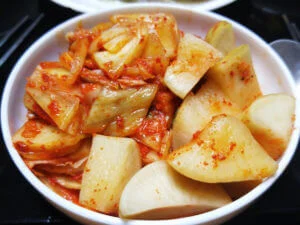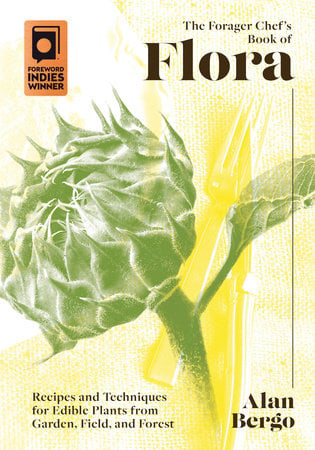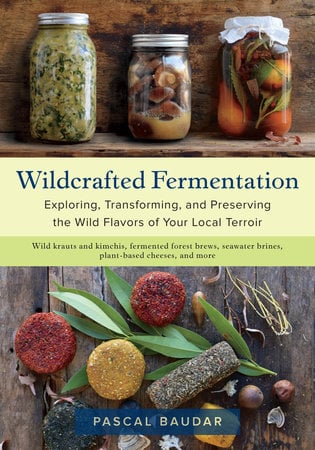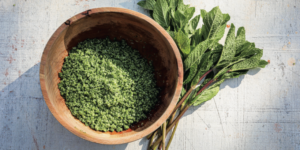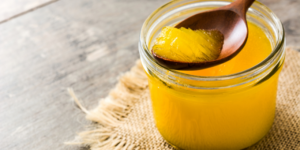Make Your Own Apple Kimchi
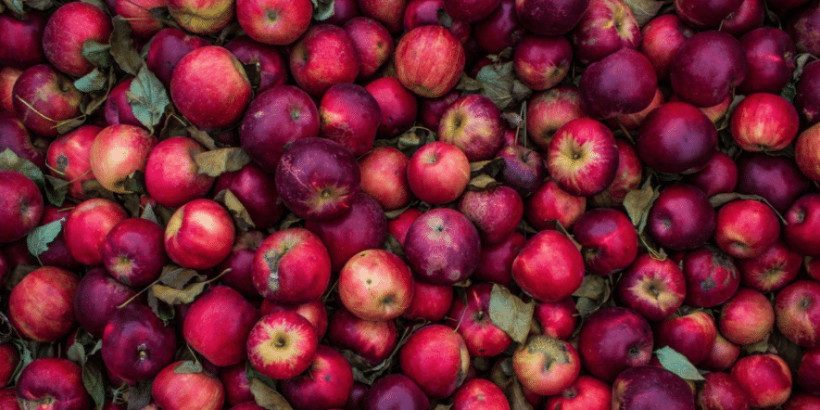
Kimchi is a tangy and spicy meal with many varieties, including some with fruits. This recipe for apple kimchi adds a seasonal twist to a classic Korean dish!
The following is an excerpt from Black Trumpet by Evan Mallett. It has been adapted for the web.
RECIPE: Apple Kimchi
Denise gave me a 5-gallon ceramic “rot pot” for my birthday one year. I made my favorite crock pickle recipe from our garden’s bounty of heirloom cukes. Then came more complex ferments. Soon, I came to realize that fermentation is not as scary as it seems.
I went through a two-year phase of fermentations for home before I came up with one I liked enough to try at the restaurant. Our staff went nuts for Apple Kimchi. It was like cuckoo for Cocoa Puffs, but with a really healthy result.
Makes about 4 glass 1-quart (1 L) jars
 Ingredients
Ingredients
- 1 head napa cabbage, outermost leaves removed, quartered lengthwise, core removed, and chopped crosswise in 1/4-inch (0.5 cm) ribbons
- 1 head red cabbage, outermost leaves removed, quartered lengthwise, core removed, and chopped crosswise in 1/4-inch (0.5 cm) ribbons
- 1 large Spanish onion, julienned
- 1 large carrot, grated
- 8 ounces assorted fresh chiles, rough-chopped, with seeds intact
- 1 head garlic, cloves peeled and thinly sliced
- 1 thumb gingerroot, peeled and sliced (1 1/2 tablespoons)
- 12 cups (2.8 L) water
- 1 cup (235 ml) cider vinegar
- 6 apples, preferably a dense heirloom variety like Blue or Gray
- Pearmain
- 1 1/4 cups (185 g) salt
- 1/3 cup (80 ml) maple syrup
- 1 stalk Mexican mint marigold (can substitute tarragon or fennel frond)
Procedure
- Mix the first seven ingredients in a large bowl, then pack in a 5-gallon (20 L) ceramic fermenting jug.
- On the stove, bring the six remaining ingredients to a boil, stir to ensure that the salt is fully dissolved, let cool, and pour into the fermenter, placing a plate or weight on top to fully submerge the veggies. Don’t worry if, at first, the vegetables are not fully submerged. They will be after a few hours of being pressed. In 3 days, the fermentation process will be under way.
- Remove the weight and inspect the top for any signs of mold. If there is mold forming, remove the surface vegetables that are hosting the mold and then—with clean tongs—stir the contents of the pot, replacing the weight and letting the ferment sit for another 3 days.
- Repeat the inspection process and let sit for 4 more days. After this 10-day period, the ferment should be sour, lightly effervescent, and full of intense flavor.
- At this point, you can choose to let it go longer for more intense flavor or pack the kimchi into sterilized quart jars, filling up each jar to the very top with the fermenting liquid, then tightly lidding the jars before refrigerating. I have kept ferments of this nature in my refrigerator for over a year, but you may want to err on the side of caution and consume it over a shorter time frame.
Recommended Reads
Recent Articles
Elevate your evenings with this delightful non-alcoholic mocktail syrup. Whether you’re looking to relax before bed or want something new to add to your tea, this non-alcoholic herbal nightcap mocktail will do the trick.
Read MoreSearching for a new way to utilize seasonings? Look no further than mint salt! This game-changer is bound to mix up the way you season meals in the future.
Read MoreFire Cider is great for stimulating digestion and warming you up from the inside out, no matter the season. This beverage can be prepared in water or tea as desired.
Read MoreReady to shake up your fermentation game? Try making Kvass, the ultimate beginner-friendly recipe! This nourishing beverage calls for just a few simple ingredients and only takes a couple of days to ferment. It’s easy, delicious & perfect for beginners.
Read MoreStart your journey to making homemade ghee! Discover how to make this delicious staple and incorporate it into delicious recipes — like our Citrus-Glazed Chicken recipe. Get ready to level up your cooking game with homemade ghee!
Read More

